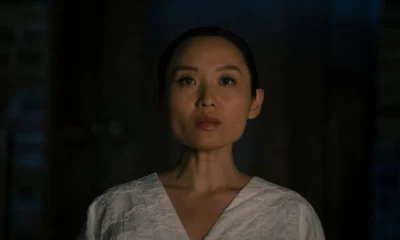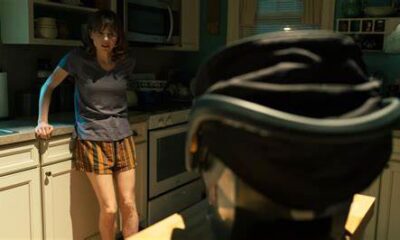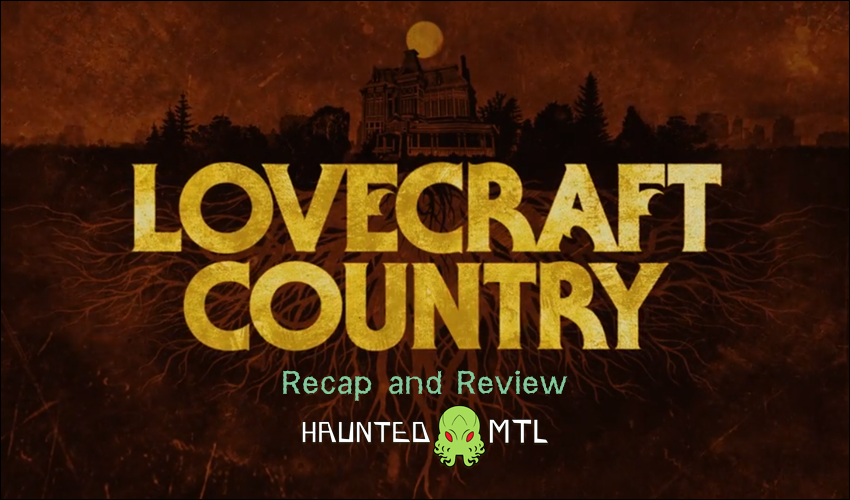
Lovecraft Country: S1E6
Lovecraft Country delivers a season-best episode in its sixth outing, “Meet Me in Daegu.” It’s not only the best episode of Lovecraft Country yet, but great horror TV in general and quite the feather in the cap of the series.
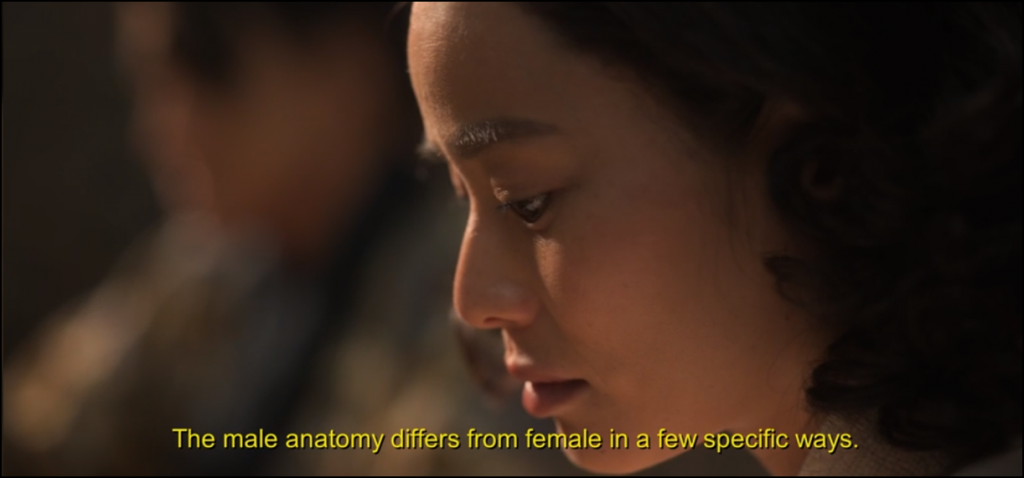
The story so far…
Ji-Ah makes her full debut in “Meet Me in Daegu.” Atticus’ overseas lover has been heard from, fought in a magic-induced vision, and given the form of the Princess of Mars in the series’ opening dream sequence, but they never indicated the potential depth of the actual person. Her first appearance delivers, though, greatly expanding the world of Lovecraft Country and slowing down the series to create a morally complex and ultimately human portrait of a technically inhuman woman in inhuman times.
The episode opens with an exuberant Ji-Ah watching Meet Me in St. Louis and begins to dance and sing in the empty theater until it is revealed she has merely imagined letting loose. She continues to watch her idol Judy Garland, reserved and alone in the darkened theater.
The series chronicles close to a year of Ji-Ah’s life, opening in 1949. She and her mother, Soon-Hee, discuss their misfortune and Soon-Hee pushes for Ji-Ah to bring home a man. At first, this suggestion seems like the annoying but ultimately supportive needling of a mother to a daughter. Ji-Ah goes on a disappointing speed-dating experience when she gets out of her nursing school, and ultimately ends up bringing home a man from a night club. They have sex until furry tentacles emerge from nearly every hole in Ji-Ah’s body, penetrating the man, absorbing his soul, and ultimately ripping him apart into a spectacular shower of gore.
We learn, then, that this is expected of her. Ji-Ah needs to find ten more men, to meet the necessary 100 souls she needs in exchange for the magic that summoned her. Ji-Ah is a kumiho, a Korean fox spirit that is said to punish wicked men.
So, Ji-Ah continues to work as a nurse and seduce men and consume souls as the war rages on, moving into the 1950s. She spends what free moments she has watched movies as well, mostly what seems to be Judy Garland films. She also connects to her friend and co-worker Young-Ja and perhaps desires more, feeling a connection that she feels is absent in her life of seduction and murder. Tragically, the nurse shift is driven to a remote area and interrogated by US soldiers who proceed to execute two of the nurses, trying to flush out a “communist sympathizer.” One of these soldiers is Atticus Freeman who callously executes one of the two nurses. Young-Ja reveals herself to be the woman the army is after, and she is dragged off to her inevitable demise.
Time marches on, the hospital is filled with wounded and the movie theater, her only refuge, is shut down due to the apparent activities of a communist sympathizer. As things look their most bleak, Ji-Ah is given a new purpose: she has one soul left to claim and Atticus Freeman is one of the patients.
Ji-Ah begins to interact with a traumatized Atticus and over a series of genial interactions they begin to strike up a relationship, bonding over The Count of Monte Christo and the mutual commiseration over their outsider status among their respective nations. Ji-Ah and Atticus fall in some kind of love, as Ji-Ah’s understanding of the concept may be skewed by the tragedy of her origins. Soon-Hee’s already tense relationship with her “daughter” is further strained by Ji-Ah’s reluctance to claim Atticus’ soul.
Soon-Hee’s anxiety is that Ji-Ah is only the physical form of her daughter, her spirit is that of the kumiho. It turns out the Soon-Hee gave birth out of wedlock, resulting in her being an ostracized woman. She later marries a man who turns out to be a pedophile who raped the young Ji-Ha. Soon-Hee visits a shaman for revenge and the price of this was the replacement of her daughter’s spirit for the kumiho’s and the need to claim the souls of 100 men. Ji-Ah only carries the barest traces of Soon-Hee’s daughter’s spirit and also contains the memories of every man killed. Soon-Hee wants her daughter back, but Ji-Ha, the soul-stealer, just wants to find acceptance.
Believing she may have found that acceptance and love with Atticus, Ji-Ah is pressured into revealing her nature to him as a final test. Before this can happen, Atticus reveals he has enough points to ship out to the US again. The pair begin to have sex but the kumiho tails emerge, despite Ji-Ah’s desperate bit to refract them as spare Atticus. The coupling results in a mind-meld of sorts, where Ji-Ah experiences Atticus’ past and future, and Atticus experiences visions as well.
They break the coupling and traumatized Atticus flees into the night as Ji-Ah cries out that he will die if he returns to the states. Sometime later, still concerned about Atticus, Ji-Ah visits the shaman, accompanied by Soon-Hee. We finally get a sense of the larger cosmic awareness that has been missing from the series; the shaman informs Ji-Ah that her moral concerns are pointless, she has no mother and Atticus’ potential death is just one of a tide of inevitable deaths.
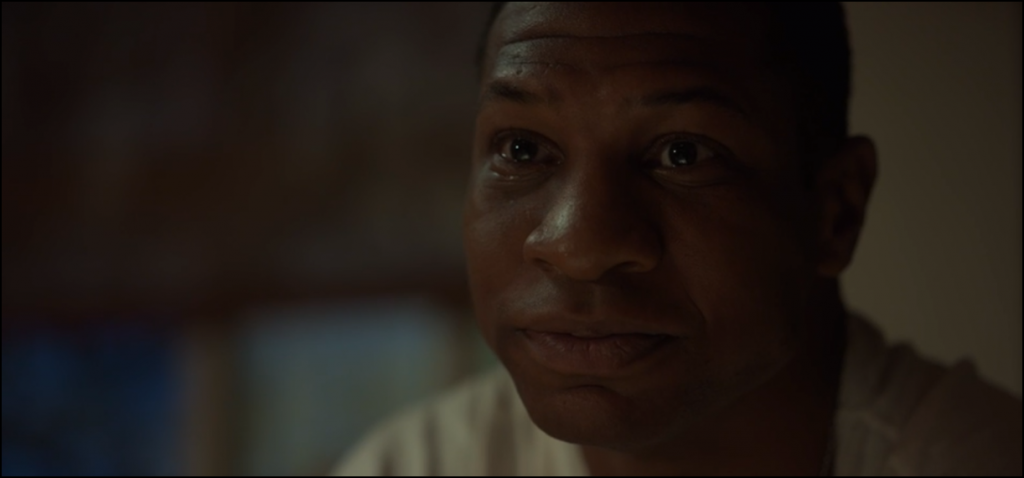
How it worked out…
The episode is suitably horrific, again, mostly based on its exploration of race, with the additional horror of jingoistic war and anti-communist fervor. However, Ji-Ah’s monstrous kumiho form is also quite disturbing and gratifying for fans of body horror. Everything about the episode just seems to click, baring the obvious plothole of Atticus’ own experience with the supernatural prior to his apparent introduction in the pilot. The episode works better as a sort of “stand-alone” horror experience compared to, say, “Holy Ghost,” mostly because it slows down to really live in the moments of horror and evil of the world. Where “Holy Ghost” was limited, it was also a bit too fast. Ji-Ah’s story, in contrast, feels far better paced.
The show also introduces the new wrinkle of Atticus being a killer in what can be seen as a morally indefensible way and how he seems to be perpetuating the vicious cycle of violence seen in Montrose and what we hear about Montrose’s own father. It’s not just the shock of Atticus’ shooting of a defenseless nurse under orders, either, but in his final night with Ji-Ah she sees that Atticus also was involved in the torture (and likely murder) of Young-Ja. It’s a hard thing to reckon with going forward. It’s a darkly complex addition to Atticus’ character that contextualizes his actions and apparent calmness regarding the supernatural in the series; he’s seen the Hell of war, but he’s also seen the unexplained.
Whether he can be redeemed of his sins is another question entirely.
The shining light of the episode, of course, is Jamie Chung who creates a complex, moving, and ultimately tragic figure in Ji-Ah in the span of an hour. Of course, Jamie Chung benefits from the writing, but her performance is a series highlight and an example of how strong the actresses of Lovecraft Country have been. Both Jurnee Smollett and Wunmi Mosaku have absolutely been the rock upon which the show has been erected, but Chung is just as up to the task as seen in this episode. How involved Ji-Ah will be going forward is in question, as she is very much a figure of Atticus’ past, but the show would be wise to keep Jamie Chung on the call-sheet going forward.
The result of this extended flashback is a sign that the weird world of Lovecraft Country could explore far more material than the Lodges and the mostly US-based horror we’ve seen. Considering the show is an adaptation of a novel with no apparent follow-up, the seeds need to be set for the future. Most of Lovecraft Country has left me feeling a bit hollow, but “Meet Me in Daegu” suggests there may be more to the concept, but the ultimate irony of this being that this material is, apparently, unique to the show.
A genuinely traumatic episode that takes far out of Lovecraft Country and into the Korean War, “Meet Me in Daegu” is perhaps the strongest episode of the show yet.
 (5 / 5)
(5 / 5)
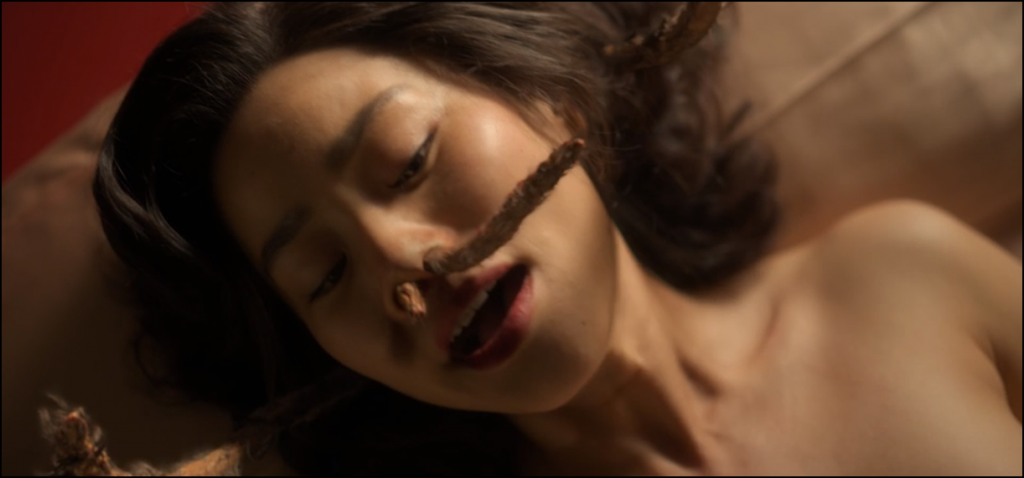
Miskatonic Musings
There was a lot to admire about the episode as well as a number of fun references.
- I am by no means an expert on Korean mythology and spirits, so take my explanation of the kumiho with several large grains of salt as my major context for it is Lovecraft Country.
- The concept of the kumiho may be familiar to Nintendo fans though. The Legend of Zelda series featured a nine-tale fox called Keaton, while Pokémon featured the nine-tailed fox pokémon Ninetails, based on the Japanese form of this spirit.
- Judy Garland is obviously all over the episode; she is a tragic figure in many ways and evoking her in Ji-Ah’s story does a lot. The heartbreaking monologue from Garland that comes near the episode underlines the level of callous disregard she, and women in general, faced for putting themselves out there.
- Judy Garland’s monologue in the final scene is taped material that was part of the process of writing her autobiography. You can listen to some of this material right here.
- The first movie we see Ji-Ah watch is 1944’s Meet Me in St. Louis, from which this episode derives its title and some of its themes. The second film is 1950’s Summer Stock with Garland and Gene Kelley.
- Again, The Count of Monte Christo becomes a key text to the events of the show. Tic’s question about why Montrose loves the book is a pretty profound one… is it the revenge that appeals to him, or Alexandre Dumas? Does it need to be exclusively one or the other?
- The show derives a fun little joke about adaptations here, with Ji-Ah dismissing the book’s story based on the film adaptation with Robert Donat she saw first, which changed the ending to the novel. This episode is material that does not seem to be in the Lovecraft Country novel written by Matt Ruff.
- I am not sure I see Ji-Ah as having forgiven Atticus’ actions, but there is a sort of mutual understanding of how the world has broken them both that allows her and him to find love. It’s incredibly messy, dark, and really beautiful in a way, despite the ugliness of the circumstances.
- I admit that my reading of Ji-Ah and Young-Ja’s relationship potentially skewing sapphic is just my own reading. The lingering hand-holding is my biggest evidence, but it could just as easily be Ji-Ah desperate for any sort of positive relationship in her life that puts the emphasis on touch. Either way, it is deeply sad to me.
- This episode’s musical choice is an obvious one, given there selection was a little limited. It’s “The Trolley Song” from Meet Me in St. Louis.
Can Lovecraft Country deliver another home run like they did this week? We’ll need to keep watching to find out. How did you find “Meet Me in Daegu?” Let us know in the comments.
Movies n TV
Wheel of Time A Question of Crimson Is a Political Espionage Delight
Episode two of Wheel of Time felt like the beginning of a long journey. Stories are unfolding, lives are changing, and blood is spilling.
Let’s discuss.
The story
We begin this episode in the past with Elayne’s mother, Queen Morgase. It turns out her rise to the throne was a bit, shall we say, cutthroat. So when she shows up at the White Tower, Siuan is concerned.
She might have reason to be, too.
Meanwhile, Rand, Egwene, Moiraine, Lan and Aviendha are in the Spine of The World. As they travel through some of the most breathtaking lands I have ever seen on a TV show, Egwene is plagued with nightmares. We think at first that’s just her trauma working itself through her system. But we soon find out that it might not be that straightforward.
Finally, Perrin returns home to heal after his hand is almost cut in half. But when he gets there he finds the town has been infested by Children of The Light. And they’re looking for him.
What worked
There was something heartwarming in this episode about political espionage and choking religious persecution. And that is Elayne’s relationship with her family.
I have consumed a lot of fantasy content with royal families. And I have never once heard a princess call her mother ‘Mum’. I’ve never seen royal siblings get along. And I have sure as hell never seen a princess have a good relationship with her step-parent.
This was refreshing. Even though Queen Morgase is kind of a horrible person she seems like a good mother. And that’s an unexpected delight.

Of course, this is just one storyline among many. And while this can sometimes be overwhelming, in this case it wasn’t.
I’ll be honest, some of these storylines are going to drag for me. I know this because I’ve read some of the Wheel of Time books and I have an idea that not all the characters exactly pique my interest.
No one likes all the characters. No one likes all the storylines. While I am here for the political espionage between Queen Morgase and Siuan, not everyone likes it. While others might be fascinated with Selene trying to win Rand back, I couldn’t care less.
Having multiple storylines keeps everyone’s attention better. So long as things don’t get out of hand. Things can easily get out of hand. But this seems to be managed well.
So far.
What didn’t work
As I mentioned above, I’m not thrilled with Rand’s story at this point. And while it’s fine to not like a storyline when there are this many to choose from, it’s not fantastic that the one I like the least is the one involving our two main characters. And anytime we were with the team at the Spine of The World, the only thing that brought me joy was Moirain’s hat. It reminded me of Stockard Channing’s hat in Practical Magic.
The problem is that Rand is Charlie Brown with controversial magical powers. He is boring, serious, and pessimistic.
And yes, I understand that he has a heavy emotional burden and he’s the Dragon Reborn and that’s quite taxing and all. But let’s be fair, there isn’t a single person in this show that doesn’t have a heavy burden. And most of them manage to be fun occasionally.

All that being said, this episode of Wheel of Time did exactly what it needed to do. It set up conflicts at each of the three locations. It established emotional ties between the characters and the events. And it established goals for everyone.
This was, in short, a solid episode. Not groundbreaking, not mind-blowing or life changing. It was simply good. It was entertaining and moved the plot forward.
Well done.
 (3.5 / 5)
(3.5 / 5)
Movies n TV
Wheel of Time Returns With A Bang
Wheel of Time is back for season three. There are mixed feelings regarding this. Last season, there were some serious pacing issues. And some serious sticking to the book’s storyline issues. But we’re two seasons in, and we don’t give up so easily. So let’s dive into episode one, To Race the Shadow.
By the way, I highly recommend watching this episode with the subtitles on. You’ll see why.
The story
We begin this episode with Liandrin facing a trial of sorts for her rampant betrayal. She does her best to gaslight her Aes Sedai sisters into thinking that Siuan Sanche is the real traitor.

When that doesn’t work, she reveals how many Black Aes Sedai have actually infiltrated the tower.
Spoiler, it’s a lot.
In the aftermath, our whole team gathers to drink and enjoy one night of relaxation before they head out to the Tear to form an army for Rand. All is going well until they’re attacked by myriad creatures and a sentient axe.
What worked
This episode was long. It had a run time of an hour and eleven minutes. And a lot of that run time was spent in heavy dialog scenes.
Fortunately, these were well-done scenes.
If you’re going to have a lot of talking scenes, there are good ways and bad ways to do it. Last season, we saw lots of examples of the bad way to do it. But this episode did it well. For one thing, other things were going on while conversations were taking place. The characters are drinking, playing games, walking through an interesting city. And the scenes themselves didn’t stretch out. They weren’t repetitive. We heard what the character had to say, then we moved on.
It was also nice that the point of these scenes wasn’t just info dumps. We had character development. We had romantic interactions. We had plot development and foreshadowing.
Overall, this episode felt like what it was. A moment of calm before a storm.
Taking a step back, I’d be remiss if I didn’t address the fight scene at the start of the episode. Because it was epic.
The magic looked amazing. The martial arts that went along with it looked fantastic. The costumes were beautiful. It was just incredibly fun to watch.
More than that, it was emotional. We lost some characters in that fight that were important. And it was clearly emotionally shattering for many of our characters, who found themselves betrayed by people they trusted.
So many of them.
It was a great way to open the season.
What didn’t work
Despite that, this episode wasn’t without its flaws.
First off, there were a lot of dialog scenes. And they were good scenes, as I’ve already discussed. But it was one after another after another. And when your episode is, again, an hour and eleven minutes, it’s maybe a little much to have so much chit-chat. Couldn’t some of these conversations, important as they were, have been moved to maybe another episode?
Finally, I want to talk about Egwene’s travel through the arches.

I feel like maybe there were some deleted scenes here. Because there must have been more to that visit than what we saw, right?
We could have seen Egwene battle Rand. That would have been badass and emotionally devastating. We could have seen her with a quiet life with Rand back home at the Two Rivers. We could have seen anything except for the quick clip of Rand in a bloody river, followed by Egwene being shoved back out in a bloody shift.
No products found.
Bad job. But at least it wasn’t an extended scene of Moiraine collecting bathwater, and then taking a bath while looking sad. If we’d started this season with another scene like that, it might have broken my brain.
Amazon dropped the first three episodes at once. So we’ll be back soon to talk about episode two. See you then.
 (4 / 5)
(4 / 5)
Movies n TV
Entertaining as hell: Eight Legged Freaks (2002) Review
Early 2000s is a special era for the industry. It accepts the cheesiness and corniness of movie making, in turn producing some gems in their own right. Eight Legged Freaks starring David Arquette and young Scarlet Johanson is a horror comedy about giant spiders who overtake a small town. As crazy as that premise sounds, the movie surprisingly has a ton of heart and is super entertaining. Let’s review, shall we?
Plot
We start Eight Legged Freaks with a shot of toxic waste spilling into the water supply of Joshua, a spider farm owner. He is friends with Mike, one of our protagonists, who is a science geek and a spider enthusiast. Mike notices something quite right upon visiting Joshua, but no one takes him seriously. We are then introduced to the rest of the crew. Mike’s mother Samantha, the town sheriff, is too busy chasing Ashley, his sister, who is dating the town mayor’s son Bret (something Samantha does not approve of). We also have Chris, who returns to the town to save his father’s legacy in the town mines. He has opposition from Wade, Bret’s father, who wants to use the mines for his business ventures. Lots of drama going on that will only get juicier once the spiders get loose.
The creepy crawlies quickly dispose of Joshua and make their grand appearance after Ashley rejects Bret’s advances, abandoning him in the middle of a desert. A glorious chase sequence ensues as the spiders make their way towards the town, wreaking havoc on its residents. In a true horror fashion (which the movie acknowledges), it takes some convincing from Mike and then from Samantha for the town to take the threat seriously. The tongue-in-cheek style of narrative adds the comedy aspect to a movie that would otherwise burn out fairly quickly.
The remaining characters hide out in a shopping mall as it’s the only somewhat sturdy building in the area. This doesn’t last long as the spiders break in, forcing them to run through the mines. Their resources to fight the creepy crawlies off are limited as the methane gas doesn’t allow them to use firearms. Such conditions require resourceful thinking from Chris, who uses perfume to fend off the leader of the spider group and save himself during the climax of the movie.
Character dynamics are not forgotten once the action kicks in. We have Chris confessing his long-term feelings for Samantha which she knew all along, which provided some comedic relief. Bret also reunites with Ashley and apologises for being an asshole. Mike finally gets the appreciation he deserves as his knowledge saves the townsfolk more than once during the whole ordeal.
We end the movie with the town’s radio show person telling the story as an urban legend during his segment. This brings it into question – how much of it happened the way he said it did? We can only guess…
Overall thoughts
Eight Legged Freaks is a fun creature feature with some self-aware commentary on genre tropes that doesn’t take itself too seriously. The acting is good, the pacing fitting and the characters are likeable enough for you to want them to make it through. Definitely a must watch, if you don’t suffer from arachnophobia, that is.
 (5 / 5)
(5 / 5)
- What do you get when you cross toxic waste with a bunch of exotic spiders? Eaten! The townies of Prosperity, Arizona will all become a screaming smorgasbord if mutated arachnids as big as SUVs have their way in this comedy/horror crowd pleaser whose creators include the producers of Independence Day and Godzilla
- Spiders that leap like gazelles, web-spitting spiders, spiders that suck your insides out as if through a straw—they’re all among the behemoths conjured up by an inventive effects team
- David Arquette (Scream) leads the two-legged stars, mobilizing the citizenry in a last-ditch fight to survive
Last update on 2025-03-10 / Affiliate links / Images from Amazon Product Advertising API








